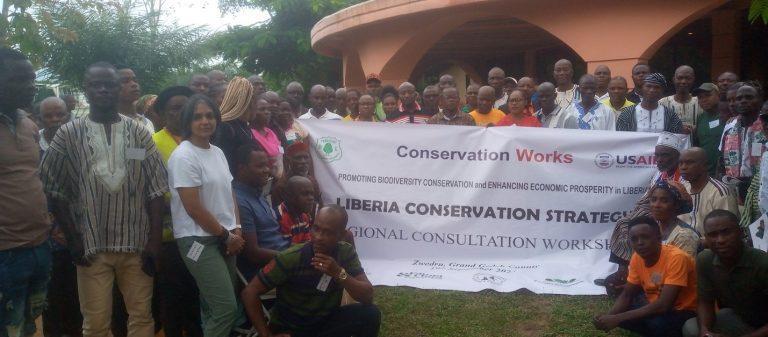Africa-Press – Liberia. A Good Neighbor Policy, aimed at enhancing stakeholder participation in the effective management and protection of the Sapo Landscape, a vital biodiversity hub in Liberia, was officially validated in Zwedru City, Grand Gedeh County, on September 18, 2023. Representatives from the Forestry Development Authority (FDA) and partner organizations involved in the landscape, including Fauna & Flora International (Fauna & Flora) and Partner In Development (PADEV), as well as traditional chiefs, members of the elders council, and local authorities from Sinoe, River Gee, Grand Gedeh, among others, attended the event to give their final approval to the framework document at the regional level. This validation marks a crucial step before the policy becomes an official working tool moving forward.
The validation workshop followed an earlier stakeholders’ co-design meeting held in March of this year, which led to the development of the draft policy. The policy outlines the commitment to biodiversity conservation by the government, communities, international and local NGOs, and private sector actors in the landscape. It also aims to enhance the long-term security of biodiversity by reducing the impact of illegal mining, hunting, and other activities that contravene the Act establishing Sapo National Park (SNP). Furthermore, the policy seeks to facilitate the natural regeneration of the Park’s ecosystem and reverse damage caused by illegal activities. It also intends to increase the Park’s resilience and its ability to respond to challenges associated with global climate change. The policy is anchored by six key strategies: promoting socio-economic development and equitable benefit-sharing, implementing a comprehensive capacity-building program, enhancing engagement and communication among stakeholders, strengthening the rule of law, and demarcating large-scale land holdings.
During the workshop, participants, through the Chair of the southeastern traditional council, Chief Emmanuel Wisseh, reaffirmed their commitment to collaborating closely to ensure the maximum care and protection of the Sapo Landscape, as outlined in the policy document. They pledged to adhere to the policy’s principles and called on the FDA and partners to continue providing sustainable livelihoods to incentivize local communities to remain engaged in safeguarding the Park effectively.
FDA Deputy Managing Director for Operations, Joseph J. Tally, commended the participants for their wisdom and collaboration in creating the policy document. He expressed hope that the policy would be effectively implemented for the benefit of current and future generations. Tally emphasized the policy’s significance as a vital tool in ensuring the protection of the Sapo landscape and other protected areas. He urged for a shift in mindset and encouraged national efforts to move away from their current passive stance.
Jerry Yonmah, the Technical Manager for Conservation at the FDA, also encouraged participants to continue demonstrating their love for the country, emphasizing the importance of managing, preserving, and conserving Liberia’s natural treasures. On behalf of Fauna & Flora, Dr. Malavika Narayana, Southeastern Landscape Manager, reiterated the significance of the meeting and Fauna & Flora’s commitment to uniting fringe communities as a cohesive force to protect the Park more effectively. She stressed the need for capacity building and sustainable livelihood projects in the communities and pledged Fauna & Flora’s dedication to upholding the terms of the policy.
In a related development on September 19th, workshop participants approved Liberia’s draft National Conservation Strategy. This strategy outlines a clear five-year plan, including goals and objectives, guiding the government and stakeholders in area-based conservation in Liberia. It prioritizes actions necessary to conserve large areas of high conservation value landscapes in Liberia, even those outside protected areas. The strategy embraces evolving best practices in conservation by emphasizing the role of communities residing near biodiversity-rich areas, such as forests, as the main actors in improving management practices. The strategy acknowledges Liberia’s international conservation commitments, including the goal of setting aside 30% of forest areas for conservation.
At the conclusion of the workshop, participants expressed concern about the significant influx of Burkinabes into various parts of the southeast, heavily engaged in deforestation for cocoa farming. They called on the government to enforce the law effectively to prevent extensive forest depletion, highlighting that the lack of law enforcement makes the forest vulnerable to illegal activities. They also decried unregulated hunting and dredge mining, which continue to pose threats to the forest’s health. Participants urged the government to discourage the bush meat trade and recommended distributing the wildlife law among judicial officials and communities to promote understanding and compliance with the law.
Shadrach Kerwillain from the Rachel Carson Center for Environment and Society at the University of Munich and Dr. Benedictus Freeman, the United States Forest Service Country Director, served as facilitators at the workshop. This initiative received support from USAID through its Conservation Works (CW) program, a 5-year effort that backs conservation projects in Liberia. The program is being executed by EcoHealth Alliance in partnership with Fauna & Flora International, Liberia Chimpanzee Rescue & Protection (LCRP), Partners in Development (PADEV), and Solimar International.
For More News And Analysis About Liberia Follow Africa-Press






